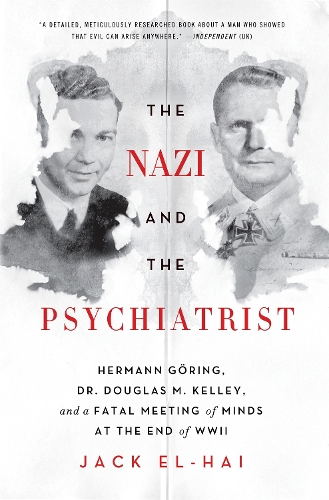
The Nazi and the Psychiatrist: Hermann Gring, Dr. Douglas M. Kelley, and a Fatal Meeting of Minds at the End of WWII
(Paperback)
Publishing Details
The Nazi and the Psychiatrist: Hermann Gring, Dr. Douglas M. Kelley, and a Fatal Meeting of Minds at the End of WWII
By (Author) Jack El-Hai
PublicAffairs,U.S.
PublicAffairs,U.S.
2nd September 2014
United States
Classifications
General
Non Fiction
Modern warfare
European history
940.531
Physical Properties
Paperback
304
Width 208mm, Height 140mm, Spine 21mm
316g
Description
In 1945, after his capture at the end of the Second World War, Hermann Goring arrived at an American-run detention centre in war-torn Luxembourg, accompanied by sixteen suitcases and a red hatbox. The suitcases contained all manner of paraphernalia: medals, gems, two cigar cutters, silk underwear, a hot water bottle, and the equivalent of 1 million in cash. Hidden in a coffee can, a set of brass vials housed glass capsules containing a clear liquid and a white precipitate: potassium cyanide. Joining Goring in the detention centre were the elite of the captured Nazi regime,Grand Admiral Donitz armed forces commander Wilhelm Keitel and his deputy Alfred Jodl the mentally unstable Robert Ley the suicidal Hans Frank the pornographic propagandist Julius Streicher,fifty-two senior Nazis in all, of whom the dominant figure was Goring.To ensure that the villainous captives were fit for trial at Nuremberg, the US army sent an ambitious army psychiatrist, Captain Douglas M. Kelley, to supervise their mental well-being during their detention. Kelley realized he was being offered the professional opportunity of a lifetime: to discover a distinguishing trait among these arch-criminals that would mark them as psychologically different from the rest of humanity. So began a remarkable relationship between Kelley and his captors, told here for the first time with unique access to Kelley's long-hidden papers and medical records.Kelley's was a hazardous quest, dangerous because against all his expectations he began to appreciate and understand some of the Nazi captives, none more so than the former Reichsmarshall, Hermann Goring. Evil had its charms.
Reviews
"Enthralling story which grips from the first page and reads like a thriller"--
Author Bio
Jack El-Hai is a widely-published journalist who covers history, medicine, and science, and the author of the acclaimed book The Lobotomist. He is the winner of the June Roth Memorial Award for Medical Journalism, as well as fellowships and grants from the McKnight Foundation, the Jerome Foundation, and the centre for Arts Criticism. He lives in Minneapolis.
